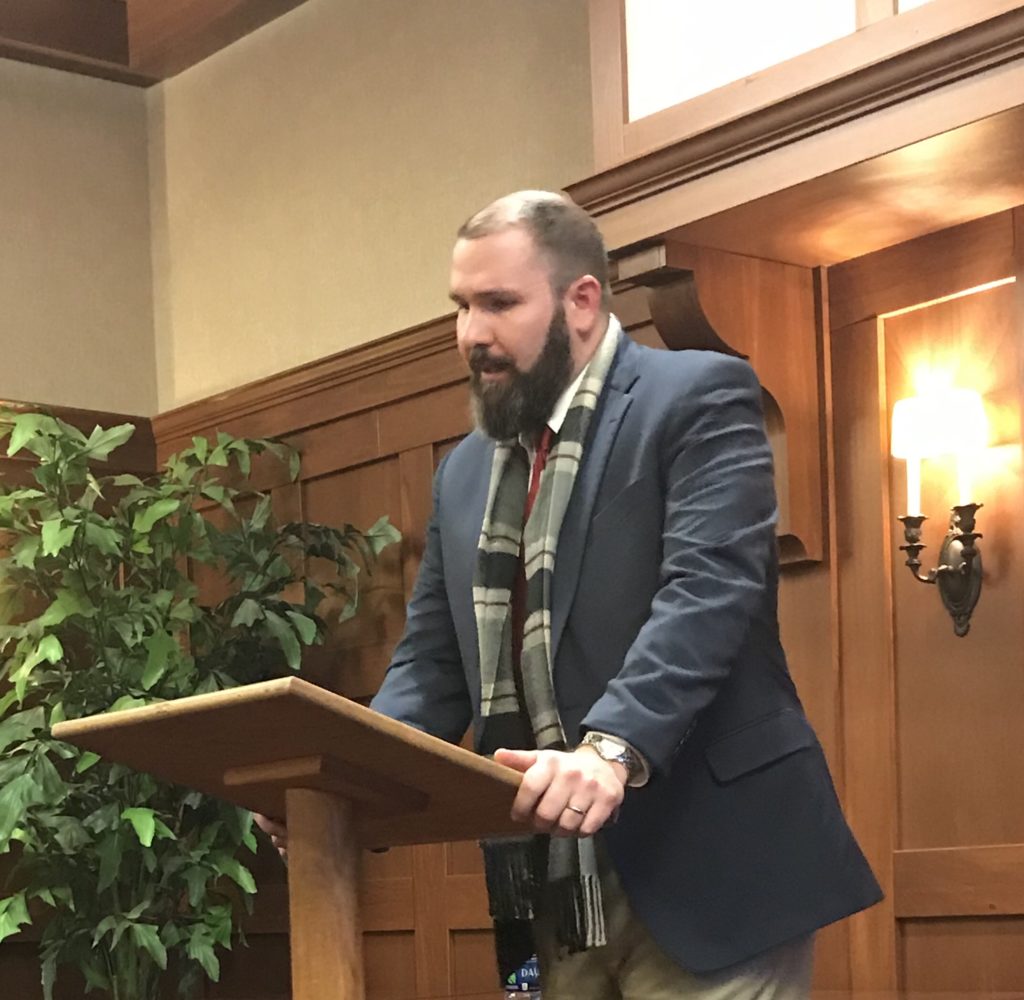
When poet Ryan Wilson, current editor of “Literary Matters,” visited Hillsdale College, students and faculty had the opportunity to hear a live reading of his poetry and attend a poetry workshop.
During his live reading, Wilson read poems he had translated, newly-written poems, and poems from his book “The Stranger World,” which won the 2017 Donald Justice Poetry Prize.
“The book moves through great spiritual darkness toward a glimpse of hope and life at the end,” Wilson said. “It is a kind of ‘katabasis’ or descent into the underworld and the return, narratively modeled on the ‘Inferno’ of Dante.”
Junior English major Dietrich Balsbaugh, who attended the poetry workshop, said that there is a notion that modern poetry isn’t good, and some poets try to sound great by writing about old things.
“When I read Wilson’s poems, I can tell that he lives in the same world I’m living in, he sees the same things,” Balsbaugh said. “I really love how he captures the world that I see as well, he’s not overly focused on sounding old.”
Senior English major Kasia Ignatik also said she appreciates Wilson’s modern content but traditional techniques.
“He sounds modern, but he still recognizes the importance of technique, language, and tradition,” Ignatik said. “It’s important to reach the audience but also preserve the integrity of poetry.”
Balsbaugh said one of his favorite poems from “The Stranger World” is “The View on Waking,” which describes contents suspended in the space between a window screen and the window glass.
“It’s a beautiful poem, it helps you see the world differently,” Balsbaugh said. “I don’t think I’ll ever look at window screen the same.”
During his live reading, Wilson compared great poetry to reality in its complexity.
“It’s something for which no pattern can be easily discerned,” Wilson said. “You’re just overwhelmed by it, you tend to wonder at it and awe at it.”
Balsbaugh said Wilson’s poems recognize that everything in the world has meaning.
“You can tell he’s writing to the world,” Balsbaugh said.
Wilson also compared the skill and craft behind great poetry to watching a magic trick.
“When you watch a magic trick, you don’t want to know how it was done,” Wilson said. “Of course, magic requires a great deal of technique, and sleight-of-hand, and everything else. If you want to learn how to do it, you have to learn those techniques. But before anything, drink in the pleasure of it, enjoy the mystery and the wonder, that’s so much what poetry is for.”
Wilson said for any content to make it into his poems, it has to interact meaningly with the form.
“If the form is not engaging with the content, it’s not really doing a lot poetically,” Wilson said.
Echoing T.S. Elliot, Wilson added that he believes there is no such thing as free verse.
“There is verse that has an irregular meter, but it’s not free,” Wilson said. “It’s not that I have a flag to wave about formal verse, it’s that the practitioners themselves value it.”
Wilson said he has learned how to create different meters, and meters that break the regular pattern expressively and meaningfully, by translating and memorizing great poems.
“You don’t want to repeat slavishly what people before you have done,” Wilson said. “You want to take the tools you inherit and take them to a new place, modify them in your own way.”
Poetry is meant to be spoken, Wilson said. Accordingly, he described saying a lot of things aloud when he writes, because he writes his own poems to be spoken as well.
“A lot of times when you start writing, your poems are just like a ball rolling down a hill, but you want it to zig and zag, the way that the voice zigs and zags in conversation,” he said. “Hearing things and exploring syntax and the way syntax can be maneuvered to sound like speech, to sound like meditation, to sound like an authentic emotional moment, to sound playful, and all these things, requires training your ear.”
In order to train his ear, Wilson said he reads poets he admires aloud, and then memorizes their poems.
“If you’re interested in writing poetry, I would say you should have at least 10,000 lines by heart,” Wilson said. “It gives you a feel for poetry that sounds like somebody speaking.”
Wilson said understanding technique is important, but the technique doesn’t at all approach the effect of a great poem: The poem is greater than the sum of all its parts.
“Revel in that wonder and that awe,” Wilson said. “That it is an important feeling to have.”

